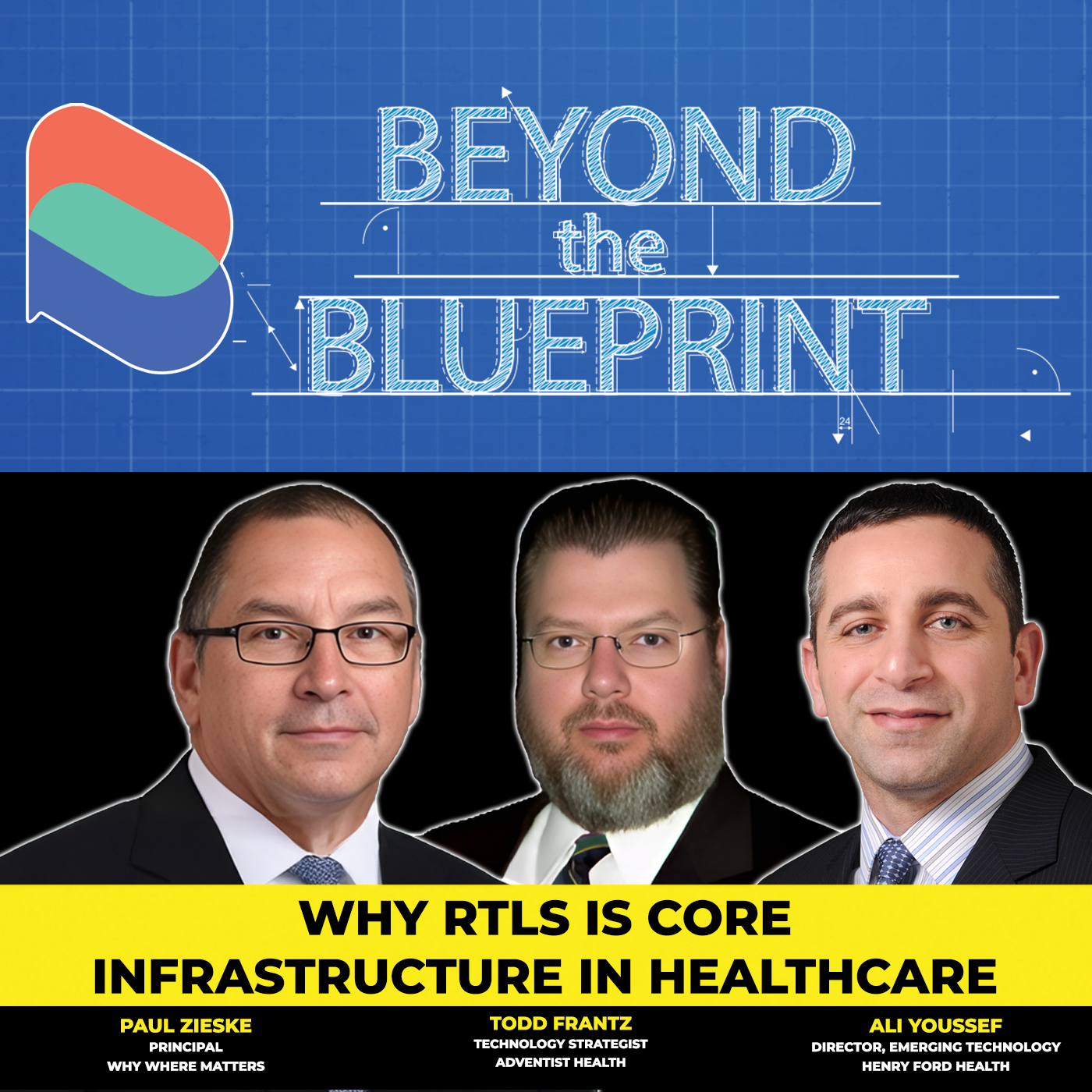Beyond the Blueprint – Health Series

Beyond the Blueprint - Health Series
Podcast Description
Redefining Healthcare Through Design
Dialogues with HIT professionals, clinical leadership, nursing, and industry innovators on integrating healthcare design into technology deployments to tackle complexity, drive innovation, improve patient care, & foment transformative change.
Podcast Insights
Content Themes
The show covers a range of healthcare-focused themes, including the integration of AI in care delivery, the 'Hospital at Home' model, and the impact of centralized surveillance systems. Episodes like 'Empowering Healthcare via Digital Engagement' and 'Strategies for Enhancing Patient Engagement & Outcomes' emphasize practical strategies and innovative solutions improving patient care.

Redefining Healthcare Through Design
Dialogues with HIT professionals, clinical leadership, nursing, and industry innovators on integrating healthcare design into technology deployments to tackle complexity, drive innovation, improve patient care, & foment transformative change.
In this episode we’re joined by Todd Frantz (AdventHealth), Ali Youssef (Henry Ford Health), and Paul Zieske (Why Where Matters) to explore how next-gen real-time location systems are reshaping care delivery.
Together, we dive into the evolution from dots-on-a-map asset tracking to intelligent platforms that drive staff safety, streamline workflows, and generate high-fidelity data for AI.
From ED duress alerts to ambient analytics and digital wayfinding, this conversation is a roadmap for health leaders rethinking how hospitals move, sense, and respond in real time.
Whether you’re planning a new facility or optimizing frontline operations, this episode will change how you think about RTLS—and why it belongs at the center of your infrastructure strategy.
Key Takeaways
- RTLS 2.0 goes beyond asset tracking—it integrates workflow, staffing, and safety data for real-time decision-making.
- Hospitals lose thousands of staff hours each year searching for equipment, impacting patient care and satisfaction.
- Successful RTLS adoption requires cultural alignment, transparency, and trust—not just technology deployment.
- Staff duress alerts and par level management are delivering fast wins and improving frontline safety.
- Enterprise-wide RTLS platforms unlock more value than siloed deployments—especially when integrated with EHRs and facility systems.
- High-fidelity location data is foundational for AI-driven insights, workflow automation, and digital twins.
- The ROI of RTLS includes reduced burnout, improved patient flow, equipment utilization, and faster care team coordination.
- Integration remains a challenge—vendors must support open standards and shared APIs to break down data silos.
- RTLS should be treated like core infrastructure—designed into new buildings, not bolted on after.
- Emerging tech like computer vision will extend RTLS into human activity recognition, situational awareness, and predictive care.
Episode Highlights
00:00 | Why RTLS Adoption Starts with Trust, Not Tech 01:53 | Welcome to Beyond the Blueprint 02:30 | From Dots on a Map to Real-Time Intelligence 03:09 | Meet the Panel: AdventHealth, Henry Ford, and Why Where Matters 04:00 | Is RTLS Now Core Infrastructure? 05:09 | The Hidden Costs of Outdated RTLS Platforms 06:02 | Workflow Integration and the Role of Location Data in AI 07:17 | Where Hospitals Miss Safety & Workflow Red Flags 08:14 | Real-Time Context and Robotics Integration 09:00 | The Chessboard Effect: Duress Alerts as a Point of Entry 10:00 | Are Enterprise Standards Emerging Across IDNs? 11:16 | Choosing the Right Tool for the Right Workflow 12:00 | Intelligent Lighting and Digital Front Doors 13:00 | Open Epic and the Rise of Indoor Wayfinding 14:00 | Integrating RTLS into Daily Workflow: It’s Cultural 15:00 | When RTLS Fails the First Time—and Why That’s Normal 16:15 | The Location Team: A Hidden Implementation Advantage 17:15 | “Blame the Process, Not the People” 18:21 | Safety Stats and Clinician Buy-In for Duress Alerts 19:49 | From Staff to Patient Expectations: The Culture Shift 20:00 | Why RTLS Data Integration Is Still So Hard 21:15 | Strategic Vendor Relationships > APIs Alone 22:45 | Will Epic Open Up? A Look at Market Influence 24:00 | How AI Wrappers Could Solve Interop Gaps 25:15 | The AAA Model: Analytics, Automation, and AI 26:00 | Why You Should Never Throw Away RTLS Data 27:15 | Use Cases for Retrospective AI + Workflow Analysis 28:16 | AI Isn’t the Goal—It’s a Tool in Your Automation Stack 29:11 | What’s Next? Computer Vision & Human Activity Recognition 30:03 | From ORs to Restrooms: Situational Awareness at Scale 31:35 | The Future of RTLS: Friction Reduction + Design Insight 33:57 | Customer Experience in Outpatient and Waiting Areas 34:55 | Final Takeaways: Safety, Trust, and Strategic Deployment
Guests: Todd Frantz, Ali Youssef and Paul Zieske Host: Gregg Malkary – Spyglass Consulting Group Cohost: Keith Washington – Companions in Courage Foundation Sponsored by: Simplifi Medical Audio/Video: Tim Jones – Health Nuts Media Marketing: Josh Troop – Troop-Creative Learn More at: www.beyond-blueprint.com

Disclaimer
This podcast’s information is provided for general reference and was obtained from publicly accessible sources. The Podcast Collaborative neither produces nor verifies the content, accuracy, or suitability of this podcast. Views and opinions belong solely to the podcast creators and guests.
For a complete disclaimer, please see our Full Disclaimer on the archive page. The Podcast Collaborative bears no responsibility for the podcast’s themes, language, or overall content. Listener discretion is advised. Read our Terms of Use and Privacy Policy for more details.